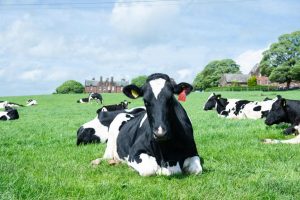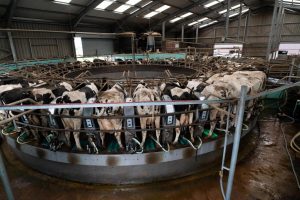
Former Defra secretary and MP for South West Norfolk Ms Truss was appointed as the new prime minister on Tuesday 6 September at a critical time for British food and farming.
Farmers are facing an increasingly challenging environment in which to produce food for the nation and protect the environment.
Soaring fuel, feed, fertiliser and energy costs, driven by the war in Ukraine, are leaving many UK farmers fearful for the future of their businesses. New measures are desperately needed to ensure their survival.
Farmers will be asking Ms Truss to support British farming by introducing policies that will boost domestic food production and ensure their businesses and livelihoods are not undercut by any cheap food trade deals signed with other countries.
They will also expect Ms Truss and her government to oversee a smooth transition from the CAP to the new Environmental Land Management (ELM) programme in England, and maintain current levels of farm funding across the UK beyond this parliament (currently due to end in 2024).
In this context, Farmers Weekly has asked farming unions and organisations to outline their top-three policy priorities for Ms Truss and her government in relation to food, farming and the environment.
We also asked farmers to tell us their views. Here is how they responded:
NFU
Farm leader Minette Batters says Ms Truss must implement a fully funded, detailed farming policy that delivers for both food production and the environment.
Mrs Batters would like the new prime minister to introduce a legal framework that ensures food production “does not become the poor relation” to everything else while striving to meet targets for rewilding, housing and green energy.
“We need to see a rock-solid commitment from all parties to produce food. For a farmer, that is, first and foremost, the main duty,” says Mrs Batters. “We have also made it very clear that we feel a minimum of 65% of the ELM budget needs to be in the Sustainable Farming Incentive.”
Second, the UK government must ensure it does not export its production and conscience abroad by signing trade agreements with other countries that don’t stick to the same high food and farming standards as ours.
Third, Mrs Batters says access to workers – both seasonal and permanent – is currently not working for every sector, whether dairy, arable, livestock, horticulture, pigs or poultry. Therefore, the goverment’s Seasonal Worker scheme must be “fit for purpose” and not restrict growth.
Tenant Farmers Association
Ms Truss must create sustainable and progressive opportunities for farm tenants through longer-term tenancy agreements, incentivised by the way owners of land are taxed, the Tenant Farmers Association (TFA) says.
The UK government must maintain public support to allow the agricultural industry to meet the dual challenges of producing public goods and correcting market failures within supply chains.
Tenant farmers must not be locked out of participation in new schemes so that landlords can be rewarded with public money by recovering possession and removing land from the let sector, says TFA chief executive George Dunn.
Third, free-trade deals signed with other countries and the way in which retail and food service supply chains are regulated must enable farmers to operate in a fair-trading environment.
Sustain
The new PM must deliver a nature-friendly and resilient food and farming system that puts healthy soil, abundant nature, diverse and nutritional food, and fairness – for farmers and workers – at its core, according to food and farming alliance Sustain.
Sustain’s head of sustainable farming, Vicki Hird, says the government must commit 100% to implementing the full agricultural transition plan and ratchet up the ambition and budget of the ELM scheme to deliver for climate, nature and food security.
It must also create a land-use framework that is inclusive, and which will deliver on net zero, nature recovery and nutritional food security through delivering sustainable, agroecological farming and nature restoration, she adds.
NFU Scotland
Ms Truss must deliver an “unequivocal commitment” to the importance of food security in the future, NFU Scotland president Martin Kennedy insists.
The government must support domestic food production and ensure its trade policy is fair and does not damage the high standards of UK food and farming.
Unsustainable electricity and fertiliser costs are creating a “crisis of confidence” among farmers. To drive confidence, Mr Kennedy says the government must support and invest in farming.
“The government has committed to support the sector to the end of this parliament, but we need a long-term commitment to invest in farming if this industry and all those reliant on it are to thrive,” he says.
NFU Cymru
Welsh farming union NFU Cymru would like to see a firm commitment from Ms Truss to a multi-annual funding agreement for Welsh farming, which should, as a minimum, honour current funding levels.
NFU Cymru president Aled Jones says Ms Truss must also set out a plan outlining how the government’s trade policy will support the growth agenda in the farming sector amid concerns about the effects future trade deals – and those already agreed with the likes of Australia and New Zealand – will have on domestic farmers.
UK farmers can play a leading role in providing the renewable energy to power a greener Britain, Mr Jones says. But constraints, including access to grid infrastructure, are holding them back from realising that ambition.
Farmers’ Union of Wales
Ms Truss and the UK government must reset international trade policy so that food security is placed at the heart of policymaking, says the Farmers’ Union of Wales (FUW).
The government must restore good relations on food and energy security with the UK’s nearest neighbouring countries, but also provide financial support to ensure domestic farmers are placed on an equal footing with farmers in the EU.
To underpin the food and farming sectors in Wales, the FUW wants to see the annual budget the Welsh government receives for agriculture from the UK treasury restored to pre-Brexit levels and maintained, as promised in the 2019 UK Conservative Party manifesto.
Ulster Farmers’ Union
The new prime minister and the UK government must give greater consideration to food security, the Ulster Farmers’ Union (UFU) says.
“The UK is 60% self-sufficient in food, but as other countries concentrate on feeding their own population, we need more focus on food security,” says UFU president David Brown.
Rising fuel, feed, fertiliser and energy costs, known as “agflation”, are also placing huge pressure on farming, and sustainability is on every farmer’s mind, adds Mr Brown, insisting there must be fairer payments from retailers to farmers to cover their increasing costs.
The food and farming industry is coming under huge pressure to meet climate targets. But Mr Brown says there must be a baseline to measure any benefits from new green schemes being introduced in Northern Ireland, such as the Soil Nutrient Health scheme.
National Federation of Young Farmers’ Clubs
A commitment to food production within progressive environmental standards, a concern for food security and support for new entrants and next generation farmers regarding future business opportunities and careers.
These are the top priorities for young farmers, according to the National Federation of Young Farmers’ Clubs (NFYFC)
Future land use will not be “an easy nut to crack”, but efficiency in production and business viability is “a must”, NFYFC chair of council Ed Dungait says.
“There is of course recognition and appreciation of the environmental ambition and continued discussion with Defra for necessary adjustments to emerging schemes or grants are welcome,” he adds.
“The opportunity to feedback as end-users is essential as we are the generation that will continue to grow food whilst ensuring businesses and environmental viability.”
What farmers want
North Yorkshire hill farmer Stephen Ramsden wants the UK government to review “the whole of agricultural policy”, due to climate change and the war in Ukraine.
Mr Ramsden, owner of Middlesmoor Estate, in Upper Nidderdale, says: “We’ve got to have more of a focus on food production and less on the environment. We all value the environment, of course, but food security is very high on people’s minds.”
He is taking part in a Sustainable Farming Incentive pilot and is so far impressed by the new agri-environment scheme because of the simple process to apply.
“To be fair to Defra, they are trying to communicate more with farmers,” says Mr Ramsden, who has been involved in stewardship schemes for the past 30 years.
But Katie Allen, a beef and sheep farmer near Cirencester in Gloucestershire, says responding to the climate crisis and repairing damage to the environment is the most pressing issue for the government.
“I think if we resolve the issues that underpin our environmental crisis, we can build a stronger, healthier society. Unfortunately, I don’t have confidence in any of our political leaders to take the steps needed to make the significant systematic changes required to achieve this.”
Dylan Jones, a beef, sheep and arable farmer on Anglesey, Wales, is keeping a close eye on what the change in leadership of the UK government could mean for devolved policy in Wales.
“We are at that crossroads at the moment where they need cheap food to feed the population, especially with winter coming up. Money is going to be scarce and energy bills sky high,” he adds.
“That is currently my main concern. I can buy as many cattle as I want, but I need to make them pay – for that to happen the public has got to buy beef.”
Liz Truss’ plans for farming
At a virtual hustings chaired by NFU president Minette Batters last week, Liz Truss set out how she will help farming.
- Domestic food production Greater investment in agriculture so farmers can produce more. Food security is a priority, but Ms Truss did not agree to a “Soviet-style” legally binding commitment, which the NFU has called for.
- Labour The short-term plan would be to expand the Seasonal Worker scheme and add more jobs to the skilled occupation list, if necessary. The Home Office must “properly engage” with Defra to ensure agriculture has the workforce it needs.
- Trade All free-trade agreements must be properly scrutinised. She insists the New Zealand and Australia deals have “very strong” safeguards in place and expects the Australia deal to be scrutinised in parliament this autumn, despite it already being ratified.
- Energy cost crisis The priority is to improve the UK’s energy self-sufficiency and provide reassurance to businesses about the soaring costs as soon as possible. She will look at what can be done about the high cost of fertiliser.

























